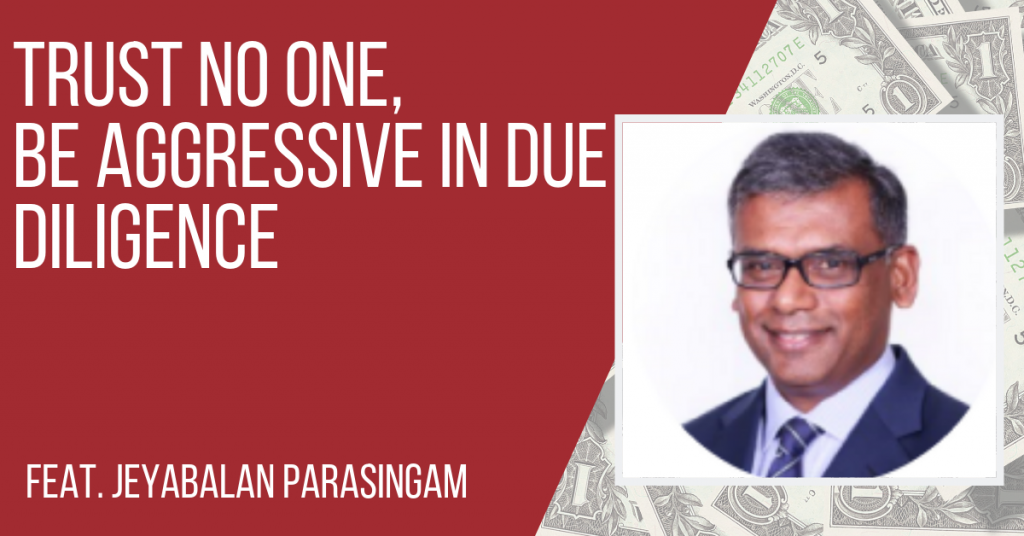Ep73: Jeyabalan Parasingam – Trust No One, Be Aggressive in Due Diligence

Listen on
Apple | Overcast | Stitcher | Spotify | Other
Guest profile
Jeyabalan Parasingam is a Certified Public Accountant (MICPA) and a Chartered Financial Analyst (CFA). He has more than 25 years of corporate experience in areas, such as finance, taxation, auditing, private equity, real estate, investment banking, and investment management. He’s been instrumental in setting up several successful start–ups over the past 15 years with a range of companies involving BPO (business process outsourcing), private equity, real estate, and technology. He has raised more than US$600 million in equity commitments over the past 10 years.
“One of the best lessons I’ve learned in stock investment is that there is no amount of over-investment that you can do in due diligence. You’ve got to start due diligence in advance by reaching out to the internal stakeholders.”
Jeyabalan Parasingam
Lessons learned
1. Due diligence behind any stock investment is vital. Start vigorous due diligence a long time in advance, which includes:
a. Speak to the competition
b. Speak to bankers
c. Pick up the phone and call a supplier or get someone else who you trust to call a supplier and pretend to be a purchaser. That can give you a better understanding of the company’s actual strengths and weaknesses
d. Don’t just use due diligence to confirm the investment. Instead, ask the question:
“Should we walk away now and lose a little bit of money that we have spent on due diligence and bringing the deal to the market, or do we continue this transaction and spend a lot and have a lot of grief later?”
Jeyabalan Parasingam
2. Forget the fact that “Big Four” accounting firms or big banks are involved in doing the due diligence because they too can make mistakes or miss crucial facts.
3. Take a central role in the due diligence. Personally oversee the proceedings and be the “duty person”, as you can hire an accounting firm to do the books, but the people actually doing the due diligence might have little to no experience.
4. Make sure the people helping with due diligence understand the sector well enough and have good enough relationships in that sector that they can provide information that would not otherwise be available.
Andrew’s categories of mistakes and their antidotes
Collated from the Worst Investment Ever series, the six main categories of mistakes made by respondents, starting from the most common, are:
- Failed to do their own research
- Failed to properly assess and manage risk
- Were driven by emotion or flawed thinking
- Misplaced trust
- Failed to monitor their investment
- Invested in a start-up company
Andrew has also developed a six-step investment process, which can help to avoid such mistakes:
- Find an idea
- Research the return
- Assess the risks
- Create a plan
- Execute the plan
- Monitor the progress
Andrew’s takeaways
1. Often investors fail to properly assess and manage risk (Mistake No. 2). And this research on risk should be clearly separated from any research on return.
2. Due diligence 1: Set up a team in your organization or your group solely to assess risk and do due diligence. The team’s sole responsibility should be to prove why the investment should not go ahead, the reasons for avoid it and explain what the risks are.
One of Andrew’s prior interviewees from London talked about having such a peer-review process within his investment team to offer counter debates, requiring it as part of their stock/company-analysis process.
3. Due diligence 2: Be an eyewitness and just go and see conditions for yourself.
a. If you’ve ranked a company in your top-10 of customers, go and meet them
b. If a company is shipping goods to a warehouse, go to the warehouse and see
4. Due diligence 3: The idea of misplaced trust (Mistake No. 4). People who are cooking the books and playing games are always going to use big brand names to hide what they are doing. But it doesn’t stop at products. Other brand names can also be used:
a. Customers’ brand names and suppliers
b. Brand names in the audit firms
c. Brand names of the banks, so:
“To be a great analyst, you must start with the premise: trust nothing, trust no one. In other words, get evidence … even branded companies and big companies and successful companies can easily miss things … particularly when someone’s really working hard to hide stuff.”
Andrew Stotz
Connect with Jeyabalan Parasingam
Andrew’s books
- How to Start Building Your Wealth Investing in the Stock Market
- My Worst Investment Ever
- 9 Valuation Mistakes and How to Avoid Them
- Transform Your Business with Dr.Deming’s 14 Points
Andrew’s online programs
- Valuation Master Class
- Women Building Wealth
- The Build Your Wealth Membership Group
- Become a Great Presenter and Increase Your Influence
- Transform Your Business with Dr. Deming’s 14 Points

